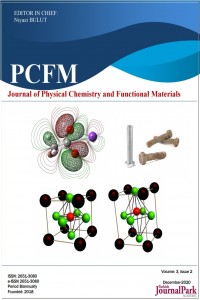Abstract
References
- A. Akkaya, H. B. Yilmaz, C. B. Chae, and T. Tugcu, “Effect of receptor density and size on signal reception in molecular communication via diffusion with an absorbing receiver,” IEEE Commun. Lett., vol. 19, no. 2, pp. 155–158, 2015.
- A. Einolghozati, M. Sardari, and F. Fekri, “Capacity of diffusion-based molecular communication with ligand receptors,” 2011 IEEE Inf. Theory Work. ITW 2011, pp. 85–89, 2011.
- L. Felicetti, M. Femminella, and G. Reali, “Directional receivers for diffusion-based molecular communications,” IEEE Access, vol. PP, no. c, p. 1, 2018.
- H. B. Yilmaz, A. C. Heren, T. Tugcu, and C. Chae, “Three-Dimensional Channel Characteristics for Molecular Communications With an Absorbing Receiver,” 2014.
- Y. Deng, A. Noel, M. Elkashlan, A. Nallanathan, and K. C. Cheung, “Modeling and Simulation of Molecular Communication Systems with a Reversible Adsorption Receiver,” IEEE Trans. Mol. Biol. Multi-Scale Commun., vol. 1, no. 4, pp. 347–362, 2015.
- Y. Deng, A. Noel, M. Elkashlan, A. Nallanathan, and K. C. Cheung, “Molecular Communication with a Reversible Adsorption Receiver,” EEE ICC 2016 - Commun. Theory Mol., 2016.
- W. Guo et al., “Molecular communications: Channel model and physical layer techniques,” IEEE Wirel. Commun., vol. 23, no. 4, pp. 120–127, 2016.
- A. W. Eckford, “Nanoscale Communication with Brownian Motion,” in 41st Annual Conference on Information Sciences and Systems, 2007, pp. 160–165.
- F. N. Kiliçli, M. T. Özşahİn, H. B. Yilmaz, M. Ş. Kuran, and T. Tuğcu, “HaberleşmeÜzeri̇ne İşti̇ri̇lmi̇ş Modeller.”
- A. Akkaya and T. Tugcu, “dMCS: Distributed Molecular Communication Simulator,” no. September 2014, 2013.
Abstract
The area where the chemical signals are used as carriers in transporting information is known as the Molecular Communication (MC). The information particles which are used for communication in the molecular communication systems consist of biological components such as proteins and DNA. Recently, together with the spread of nanotechnology, the number of publications related with molecular communication also increases. Various researchers propose new methods and techniques for the science of nanotechnology to be used more efficiently in various fields such as medical and nanorobot. These methods rather address solving the inter-cellular communication problems today. In this study, in contrast with the literature, half sphere receiver model in a different topology has been analysed. This is due to the potential of different receiver models instead of micro strip or patch antenna in the digital communication systems. For this reason, different forms of the receiver have been tried and the signal transmitting ratio is tried to be increased and the intermolecular interference to be decreased.
Keywords
References
- A. Akkaya, H. B. Yilmaz, C. B. Chae, and T. Tugcu, “Effect of receptor density and size on signal reception in molecular communication via diffusion with an absorbing receiver,” IEEE Commun. Lett., vol. 19, no. 2, pp. 155–158, 2015.
- A. Einolghozati, M. Sardari, and F. Fekri, “Capacity of diffusion-based molecular communication with ligand receptors,” 2011 IEEE Inf. Theory Work. ITW 2011, pp. 85–89, 2011.
- L. Felicetti, M. Femminella, and G. Reali, “Directional receivers for diffusion-based molecular communications,” IEEE Access, vol. PP, no. c, p. 1, 2018.
- H. B. Yilmaz, A. C. Heren, T. Tugcu, and C. Chae, “Three-Dimensional Channel Characteristics for Molecular Communications With an Absorbing Receiver,” 2014.
- Y. Deng, A. Noel, M. Elkashlan, A. Nallanathan, and K. C. Cheung, “Modeling and Simulation of Molecular Communication Systems with a Reversible Adsorption Receiver,” IEEE Trans. Mol. Biol. Multi-Scale Commun., vol. 1, no. 4, pp. 347–362, 2015.
- Y. Deng, A. Noel, M. Elkashlan, A. Nallanathan, and K. C. Cheung, “Molecular Communication with a Reversible Adsorption Receiver,” EEE ICC 2016 - Commun. Theory Mol., 2016.
- W. Guo et al., “Molecular communications: Channel model and physical layer techniques,” IEEE Wirel. Commun., vol. 23, no. 4, pp. 120–127, 2016.
- A. W. Eckford, “Nanoscale Communication with Brownian Motion,” in 41st Annual Conference on Information Sciences and Systems, 2007, pp. 160–165.
- F. N. Kiliçli, M. T. Özşahİn, H. B. Yilmaz, M. Ş. Kuran, and T. Tuğcu, “HaberleşmeÜzeri̇ne İşti̇ri̇lmi̇ş Modeller.”
- A. Akkaya and T. Tugcu, “dMCS: Distributed Molecular Communication Simulator,” no. September 2014, 2013.
Details
| Primary Language | English |
|---|---|
| Journal Section | Articles |
| Authors | |
| Publication Date | December 6, 2020 |
| Submission Date | November 27, 2020 |
| Acceptance Date | November 30, 2020 |
| Published in Issue | Year 2020 Volume: 3 Issue: 2 |
Cite
© 2018 Journal of Physical Chemistry and Functional Materials (JPCFM). All rights reserved.
For inquiries, submissions, and editorial support, please get in touch with nbulut@firat.edu.tr or visit our website at https://dergipark.org.tr/en/pub/jphcfum.
Stay connected with JPCFM for the latest research updates on physical chemistry and functional materials. Follow us on Social Media.
Published by DergiPark. Proudly supporting the advancement of science and innovation.https://dergipark.org.tr/en/pub/jphcfum


